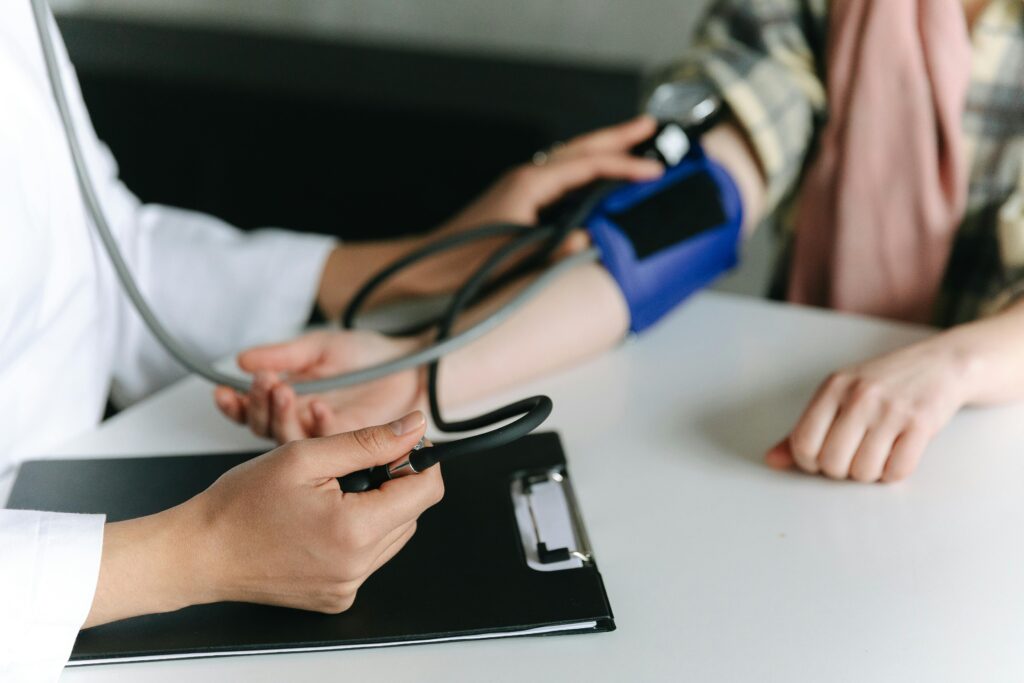Risk of Hypertension
🩺 The Silent Threat: Risks of Undiagnosed Hypertension
Hypertension, often termed the “silent killer,” frequently goes unnoticed due to its lack of overt symptoms. In India, studies indicate that nearly 45% of individuals with hypertension are unaware of their condition, with a higher prevalence among males and those without comorbidities.
⚠️ Health Risks of Undiagnosed Hypertension
Undiagnosed hypertension can lead to several severe health complications:
- Cardiovascular Diseases: Elevated blood pressure can cause thickening of the heart’s left ventricle, increasing the risk of heart failure and heart attacks.
- Stroke: High blood pressure can damage the arteries leading to the brain, increasing the likelihood of strokes.
- Kidney Damage: Hypertension can damage the blood vessels in the kidneys, leading to kidney failure.
- Vision Loss: High blood pressure can cause damage to the blood vessels in the eyes, leading to vision impairment.
- Cognitive Decline: Chronic hypertension is associated with cognitive decline and an increased risk of vascular dementia.
🩺 Importance of Regular Screening
Given the asymptomatic nature of hypertension, regular blood pressure monitoring is crucial, especially for individuals over 30, those with a family history of hypertension, or those leading sedentary lifestyles. Early detection allows for timely intervention, reducing the risk of severe complications.
✅ Management Strategies
- Lifestyle Modifications: Encourage patients to adopt a heart-healthy diet, engage in regular physical activity, reduce alcohol intake, and manage stress.
- Medication Adherence: Prescribe antihypertensive medications as needed and emphasize the importance of adherence to prescribed regimens.
- Regular Monitoring: Advocate for regular follow-up visits to monitor blood pressure and adjust treatment plans accordingly.
🧭 Conclusion
Undiagnosed hypertension poses significant health risks. As healthcare providers, it’s imperative to educate patients about the importance of regular blood pressure checks and the potential consequences of untreated hypertension. Early detection and proactive management can significantly improve patient outcomes. 🩺 The Silent Threat: Risks of Undiagnosed Hypertension
Hypertension, often termed the “silent killer,” frequently goes unnoticed due to its lack of overt symptoms. In India, studies indicate that nearly 45% of individuals with hypertension are unaware of their condition, with a higher prevalence among males and those without comorbidities.
⚠️ Health Risks of Undiagnosed Hypertension
Undiagnosed hypertension can lead to several severe health complications:
- Cardiovascular Diseases: Elevated blood pressure can cause thickening of the heart’s left ventricle, increasing the risk of heart failure and heart attacks.
- Stroke: High blood pressure can damage the arteries leading to the brain, increasing the likelihood of strokes.
- Kidney Damage: Hypertension can damage the blood vessels in the kidneys, leading to kidney failure.
- Vision Loss: High blood pressure can cause damage to the blood vessels in the eyes, leading to vision impairment.
- Cognitive Decline: Chronic hypertension is associated with cognitive decline and an increased risk of vascular dementia.
🩺 Importance of Regular Screening
Given the asymptomatic nature of hypertension, regular blood pressure monitoring is crucial, especially for individuals over 30, those with a family history of hypertension, or those leading sedentary lifestyles. Early detection allows for timely intervention, reducing the risk of severe complications.
✅ Management Strategies
- Lifestyle Modifications: Encourage patients to adopt a heart-healthy diet, engage in regular physical activity, reduce alcohol intake, and manage stress.
- Medication Adherence: Prescribe antihypertensive medications as needed and emphasize the importance of adherence to prescribed regimens.
- Regular Monitoring: Advocate for regular follow-up visits to monitor blood pressure and adjust treatment plans accordingly.
🧭 Conclusion
Undiagnosed hypertension poses significant health risks. As healthcare providers, it’s imperative to educate patients about the importance of regular blood pressure checks and the potential consequences of untreated hypertension. Early detection and proactive management can significantly improve patient outcomes.

